In these United States of America, decisions about the make-up of a community mostly happen at the local level. I’ve spent nearly 20 years now writing stories about a basic theme: Where are people going to live in the future?
In Virginia, a locality answers that question thematically by maintaining a Comprehensive Plan “for the physical development of the territory within its jurisdiction.” Such plans are forward-looking and influence policies to determine how a local government will respond to population forecasts put together by the Weldon Cooper Center for Public Service at the University of Virginia.
Each week, this newsletter seeks to give everyone the information they need to understand the context for decisions facing elected officials for both future growth and for services for people who are already here. The goal of this Sunday version is to get as many people as possible to see the underlying documents. I feel that’s a primary reason to practice journalism.
Here’s some of what’s happening this week:
- Charlottesville City Council has a full meeting Monday with a budget work session, a presentation on an expensive parks and recreation master plan, and will consider a proposed $3 million contribution to the Salvation Army for their project to expand their facility on Ridge Street.
- The Charlottesville Board of Architectural Review will resume on Tuesday pre-application conversations for an affordable housing project at 1000 Wertland Street and the potential redevelopment of the Violet Crown as a 13-story building.
- The Albemarle Economic Development Authority on Tuesday will amend a previous resolution of support for a grant to provide funding to build more space for the life sciences sector to prepare for the arrival in a few years of the Manning Institute of Biotechnology at UVA.
- The Albemarle Planning Commission will continue review of the Comprehensive Plan and will hold a public hearing for a rezoning in Crozet that is opposed by nearby residents.
- There are no meetings in Louisa County until 2025. Mark your calendar for January 6, 2025!
Thanks to the Piedmont Environmental Council for their sponsorship of this weekly look at what’s coming up.
Monday, December 16, 2024
Charlottesville City Council to vote on use of $3M in ARPA funds to contribute to expansion of Salvation Army facility on Ridge Street
The penultimate Charlottesville City Council meeting for 2024 can perhaps be seen as a preview for big decisions to be made in 2025. The five elected officials meet at 4 p.m. in City Council Chambers for the third of three preliminary budget work sessions for Fiscal Year 2026 followed by a regular meeting at 6:30 p.m. (meeting info)
As with the first budget briefing and the second budget briefing, the presentation has not been made available in advance. This one is on public safety and transportation, two of the pillars in the city’s strategic framework.
“Under Public Safety, the key headings will be: Fire Services, Alternative Response, and Emergency Management,” reads the staff report. “Under Transportation, the key headings will be: staffing, network performance, climate action, and critical needs.”
There are two items on the consent agenda worth noting. One is the first of two readings to approve $314,765.28 that comes from a grant from the Virginia Department of Conservation and Rescue’s Recreation Trails Program. The city is paying a $78,691.32 match. This is not the only source of revenue for the project. In November, Council approved a transfer of $55,000 in federal Community Development Block Grant funding to this project as I wrote at the time. Take a look at the staff report for more information.
The second item is the first and only reading of an emergency use of $200,000 from the city’s Capital Improvement Plan contingency fund to address repairs at the Fontaine Fire Station.
“Recent rain events have uncovered an underground cavity that threatens to undermine the structural stability of the drive apron at the Fontaine Fire Station,” reads the staff report. “This apron is the approach to the parking bays for the fire apparatus which operate at Fontaine, and a structural failure while under load could be catastrophic.”
The report faults shoddy workmanship related to the construction of the station ten years ago.
“The cavity was caused by a utility vault that was not properly and permanently sealed when the original utility work was done,” the report continues.
Will that contractor pay a penalty?
During the report from City Manager Sam Sanders, Council will get an update on the creation of a master plan for the parks and recreation department. A key component is a plan to pave 12 miles of trails throughout the city.
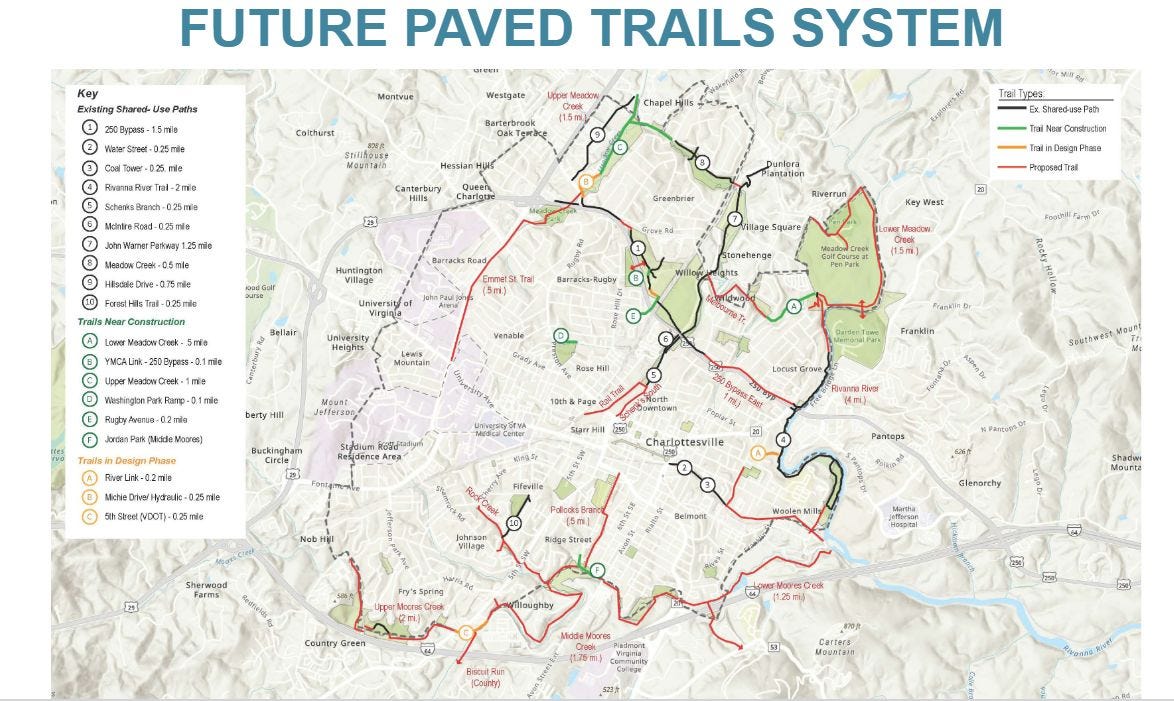
The master plan also includes new amenities for some city parks but not all. Take a look here and these are some of the highlights:
- The tennis courts at Tonsler Park would be converted to multipurpose courts to accommodate the sports of pickleball and futsal. The baseball diamond would be upgraded and a cricket pitch would be added.
- A community garden would be build in the lower section of Washington Park and an existing baseball diamond is being eyed for a potential dog park. Two new picnic shelters would be added.
- In Court Square Park, a formal plaza with a fountain would be built where a Confederate statue formerly stood.
- A plaza would also be installed at Market Street Park with an “event lawn” created in the southern half of the space.
- A new Kindlewood Park would be created with community gardens, bench swings, and other amenities.
All of this comes with a price tag of $75,729,672 with projects divided into three categories. Most of the spending is anticipated to take place in FY32 through FY36.
There will also be a presentation of this on December 17 at 6 p.m. at the Carver Recreation Center.
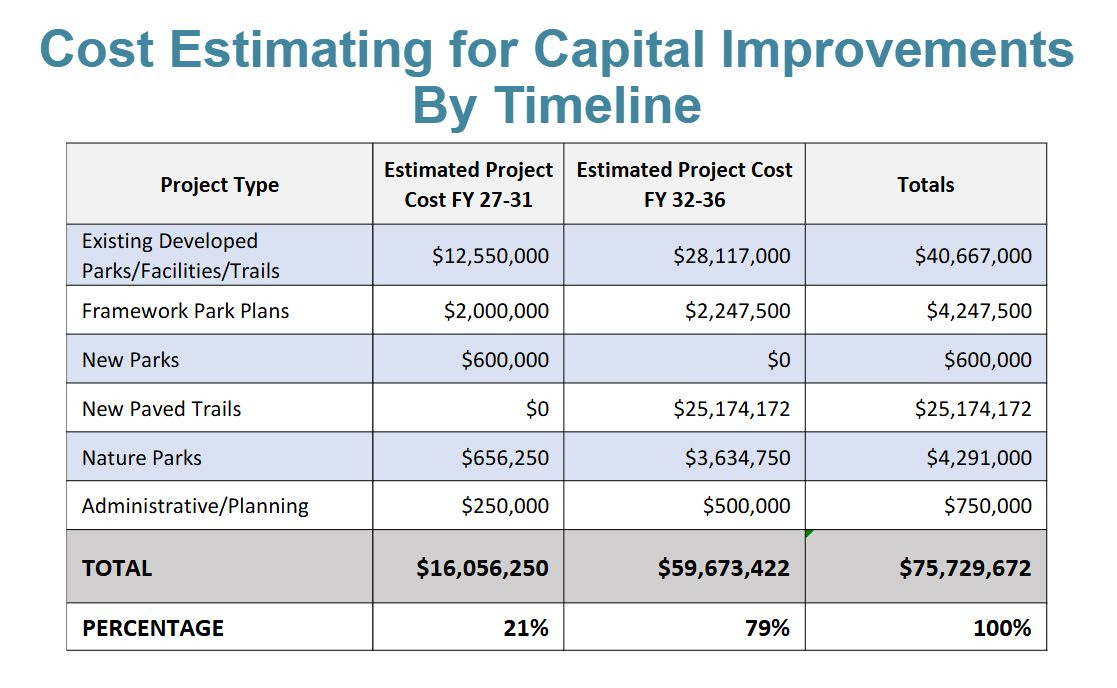
After that presentation, the meeting really gets underway. The first regular item is a public hearing on the supplemental appropriation of over $7.5 million in capital funding for Charlottesville Area Transit. The majority ($5.15 million) comes from the Virginia Department of Rail and Public Transportation with $2.12 million in federal funding and a $302,852 match from the city. According to the staff report, this will be used for:
- Automated Vehicle Locating software
- Four replacement engines
- Vehicle support equipment
- Three support vehicles
- Two battery-electric buses (under a pilot program agreed to in March)
- Eight diesel buses (replacements)
The pilot also included the purchase of hydrogen vehicles but that won’t take place until FY2027. Read the details in a story I wrote back in March.
Next up is the presentation on the city’s audit of the FY2024 books. A surplus is expected, but how large? The materials are not available at publication time. As with previous surpluses, Council will likely spend all of the money.
In the past four years, there has been an influx in a lot of cash from the federal government to help localities recover from the COVID-19 pandemic which began with a shut-down of nearly everything. In addition to the original CARES Act, there was also the American Rescue Plan Act which was signed into law by President Joe Biden in the spring of 2021.
“The City of Charlottesville received a total of $19,609,708 from UST in two equal tranches in May 2021 and June 2022,” reads the staff report.
The city has used the funds for over 50 projects since then. Localities have until December 31 of this year to tell the federal government how all of the will be spent and all of the money has to be spent by December 31, 2026.
There is $3.7 million in funds that have not been spent and Sanders has a list of how the funding will be used. Three million of that is expected to be built to pay the Salvation Army with the expansion of their facilities on Ridge Street.
“The new facility will double the current year-round emergency shelter capacity,” reads the staff report. “In addition, there will be space for hunger relief through a community dining room, collaboration space with local social service agencies, and more case management space to prevent homelessness and meet other basic human needs.”
This is a separate project from one to pay the Salvation Army for lost revenue if their thrift store on Cherry Avenue is converted to a low-barrier shelter. That will come back in January.
The rest of the ARPA funds will be used to reimburse the city for public safety payroll costs incurred since the beginning of this fiscal year.
After that, Council will be asked to follow the Albemarle Board of Supervisors to join the Charlottesville-Albemarle Regional Transit Authority. For more information and context, read the story I wrote on this last week.
The final two items have been at Council the last two meetings and I’ve not had a chance to write up either of them.
The first is another discussion of an ordinance change that would expand the number of vehicles that would be prohibited from parking on city streets overnight to include semi trucks, vehicles with antique plates, vehicles with farm use plates, boats, and recreational vehicles.
“The revised code section would also prohibit the covering or tarping of a vehicle or trailer in such a manner that restricts or impedes inspection of the vehicle’s license plate and state inspection within the City limits at any time,” reads the staff report. “The revised code section also contains a provision which would prohibit a person, business, or corporation from performing service or repairs on a vehicle parked on a public street within the City, or to store or park any motor vehicle left in the custody of a business on City rights-of way.”
This will be the third time this has gone before Council. What do the draft minutes say happened on December 2, 2024?
“This ordinance having been introduced at the November 18, 2024, City Council meeting, City Engineer Brennen Duncan answered questions for City Council. City Manager Sanders stated that the Police Chief and Commonwealth’s Attorney would like time to review the proposal and give input. He suggested postponing consideration of action on the ordinance.
“On motion by Payne, seconded by Oschrin, Council by a vote of 5-0 postponed further consideration of the ordinance amending City Code Section 15-144 (Parking of buses, trucks, etc. between Midnight and 6:00 a.m. to a future meeting (Ayes: Oschrin, Payne, Pinkston, Snook, Wade; Noes: None)
The final item is another item that was also postponed. These are changes to the guidelines for outdoor cafes. (staff report)
To move this edition along, I’m copying the draft minutes again.
“James Freas, Deputy City Manager for Operations, stated that NDS staff are willing to meet with individual council members to answer further questions, and he suggested that Council defer consideration of action on the resolution until a future meeting.”
There does not appear to be any record of what was discussed at those meetings or if they occurred.
ARB to review 14-unit Arbor Oaks Townes project near Albemarle High School
The Albemarle Architectural Review Board meets for the final time in 2024 at 1 p.m. in Lane Auditorium in the county’s office building at 401 McIntire Road. They’ll take a look at the initial site development plan for a 14-unit complex being built on an acre in a place where Albemarle has called for that level of intensity in their Comprehensive Plan.
Albemarle Supervisors approved a rezoning for property on Hydraulic Road in January from Residential-4 to Residential-15, something encouraged by a subsection of Albemarle’s Comprehensive Plan.
“The Places29 Master Plan shows this parcel is designated as Urban Density,” reads the narrative from the rezoning. “The R- 15 Residential zoning will provide a density of 14. 6 dwelling units per acre, which is consistent with the Comprehensive Plan, Land Use plan and Places29 Master plan.”
The ARB takes a look at projects within the county’s entrance corridors. This particular section of Albemarle is within the geographic scope of the Places-29 Hydraulic Community Advisory Committee. Take a look at the staff report here.
The EDA next meets on January 21, 2025.
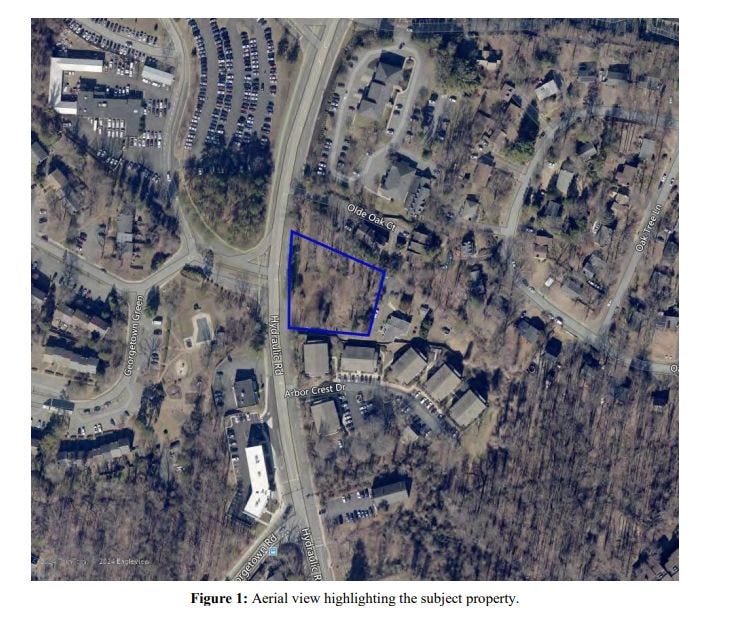
Tuesday, December 17, 2024
Albemarle EDA to update support for $4.3 million grant to CvilleBioHub for BioAccelerator
When the Weldon Cooper Center projects the future population for Virginia localities, they may not necessarily be taking economic development efforts into account.
In the past ten years, Albemarle has gone from having no economic development office to one that is very active in promoting the locality’s targeted industries. This work includes support for the biotechnology and life sciences sector.
The Albemarle Economic Development Authority has a virtual meeting at 4 p.m. at which the group will reaffirm its pledge to match a statewide grant with a $300,000 contribution to CvilleBioHub that was first agreed to in March. At the time, the nonprofit was applying for a GO Virginia grant from the Department of Housing and Community Development for its Commonwealth BioAccelerator Project. (meeting information)
“GO VIRGINIA is a statewide economic development initiative designed to drive the growth of higher paying jobs and diversify regional economies by incentivizing collaboration between business, higher education, and local government through regional councils,” reads a resolution that updates the resolution from March.
The BioAccelerator Project is an effort to provide more laboratory space throughout the community for companies that may form here when the Manning Institute of Biotechnology comes online at the University of Virginia.
This initiative is known as Project Vital and there’s a memorandum of understanding between nearly a dozen entities for what is also known as Virginia Innovation Team for Accelerating the Life Sciences. According to Section F of the MOU, The Central Virginia Partnership for Economic Development and CvilleBioHub have been awarded $4,302,887 in funds.
The contract is also of interest because it lays out how much money is being added to the project from various entities.
“A total match of $2,702,158.35 in matching funds over three years is committed to this
PROJECT by the Quantitative Foundation, Evan Edwards, Cooley, CSC Leasing, ThermoFisher, Virginia Bio, The Manning Family Foundation and the University of Virginia,” reads the contract.
This contract also lays out milestones for the three years of the grant and might be worth a look if you’re interested in the future of this industry.
Resources:
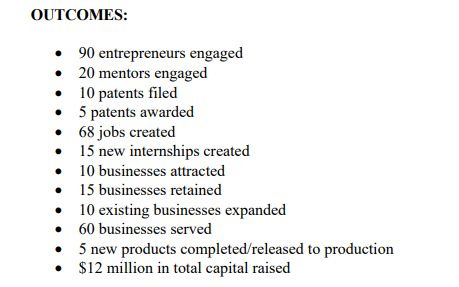
Albemarle PC to continue review of next Comprehensive Plan, hold public hearing on rezoning for 134-unit Crozet development
The unincorporated area known as Crozet is western Albemarle County is one place the Comprehensive Plan calls for growth. However, the zoning there does not quite match the aspirational goals which means that the Board of Supervisors usually has to agree to a higher density than allowed under existing rules.
The final meeting of the Albemarle Planning Commission for 2024 includes a public hearing for a rezoning for a property that is also the subject of a lawsuit. But that item won’t be heard until after a 4 p.m. work session on the update of the Comprehensive Plan. (meeting info)
This time around the appointed body will be asked to provide feedback on the draft Environmental Stewardship chapter.
“Albemarle County’s landscape, located in the Virginia Piedmont and on the eastern flank of the Blue Ridge, provides a source of clean water for the community, vegetation and soils that sequester and store carbon dioxide, and a home to a diverse array of native plant and animal communities,” reads the introduction to the chapter. “The County’s policies for environmental stewardship involve both protecting vital resources for the community’s use and protecting healthy terrestrial and aquatic ecosystems.”
This chapter is less about land use and more about how the policies might be fine-tuned in the future. Without going into too much detail, I’ll just post, verbatim, the four questions being asked of the Planning Commission.
1. Does the Commission support prioritizing the implementation of incentives for low impact development (LID) for stormwater management, as depicted in Objective 2?
2. Should the actions include more measures for biodiversity protection or related demonstration projects on County-owned lands?
3. Do the actions for objectives 1 and 3 sufficiently address protection of public water supplies and groundwater supplies?
4. Are there any topics (especially within the narrative) and/or actions that need additional context or explanation?
I am hopeful during the holiday break that I can get caught up on all of the recent work sessions.
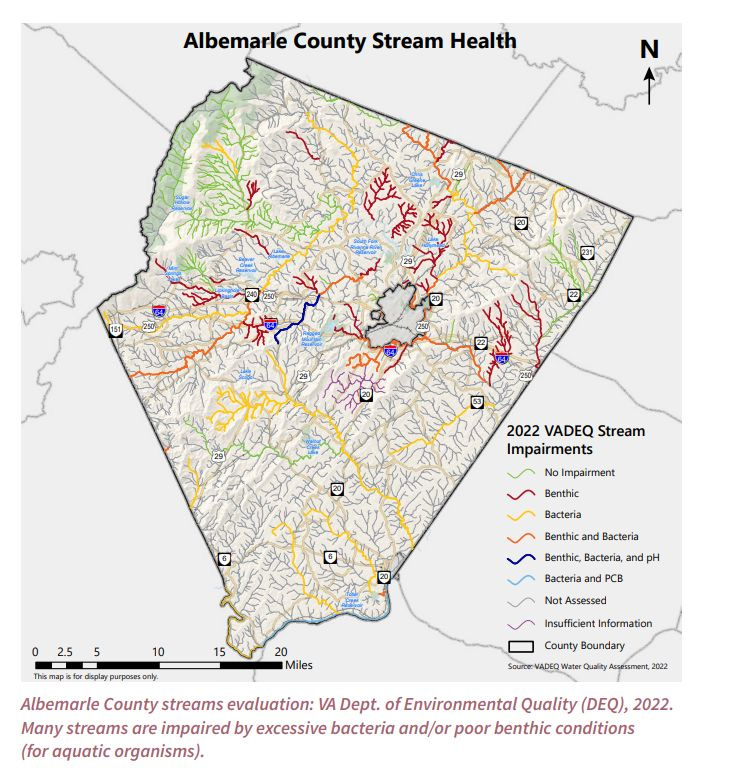
The meeting will conclude with several public hearings related to modifications to agricultural-forestal districts. Check the agenda for those details. The main event for this entire week is likely the rezoning that Riverbend Development seeks for a 134-unit development called Oakbluff. The 32.887 acre property is currently zoned for one unit per acre, or R-1. The request is to change that to Planned Residential Development to allow up to 35 units per acre.
“Additional housing density is achieved in this key growth area, affordable housing is provided and environmentally sensitive features of the site are preserved and highlighted,” reads the narrative for the rezoning dated February 20, 2023.
In July 2021, the Board of Supervisors adopted the Housing Albemarle plan which has as its first goal the production of more housing.
The narrative states this development will be at six units per acre which matches the upper range of the Neighborhood Density Residential in the Crozet Master Plan.
Three nearby residents filed suit in Albemarle County Circuit Court on February 1 of this year against two subsidiaries of Riverbend (Oak Bluff LLC and Lickinghole Creek LLC) as well as Stanley Martin Homes. The lawsuit argues that one of the parcels is still subject to a restrictive covenant and that Stanley Martin failed to meet the terms of a declaration by not holding annual meetings.
The public hearing offers a chance for the many opponents of the project to express their concerns before the Planning Commission.
“Staff has received a significant amount of Community Input on this project with nearly all of it expressing opposition to the development as proposed,” reads the staff report. “These emails are on file with the Planning Division but have not been included with this staff report because of the volume of documents.”
This material also does not appear to be included in the online folder for rezoning ZMA202300002. Take a look and see yourself.
Staff recommends approval for four reasons including consistent with the Crozet Master Plan and the provision of right of way for the Eastern Avenue connector project. Opponents have taken issue with the way that project is proceeding.
- Albemarle Supervisors briefed on alternate transportation funding mechanism, April 11, 2024
- Albemarle Supervisors briefed on procurement mechanism for Eastern Avenue, August 16, 2024
I’ll be certain to report what happens.
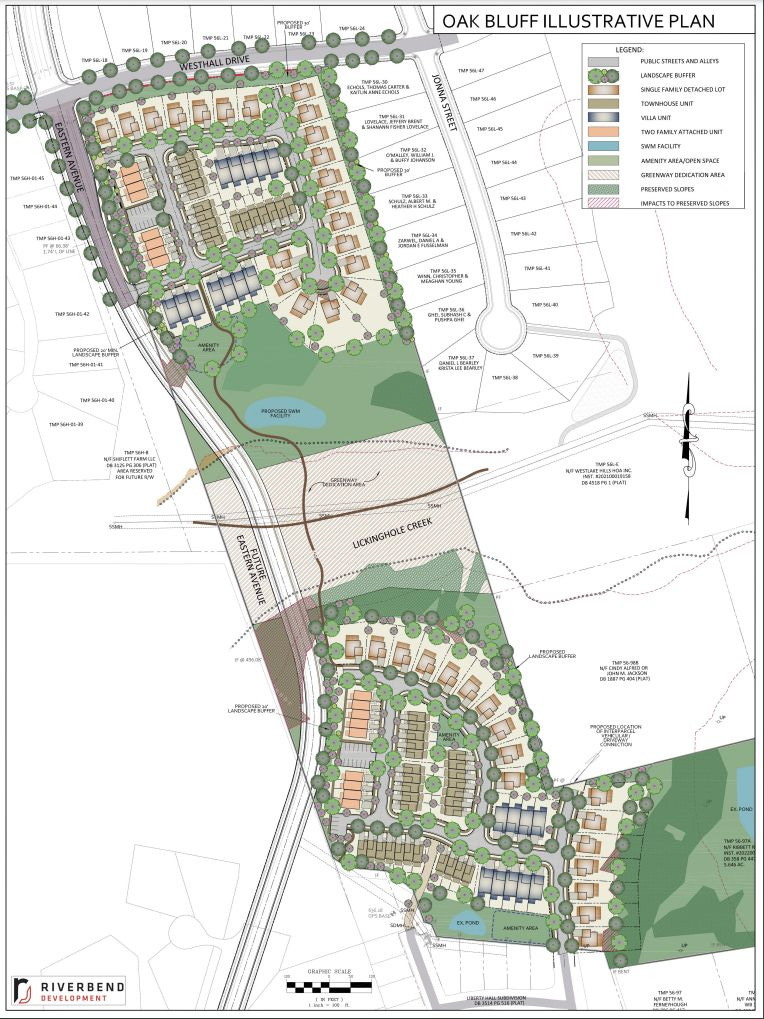
Charlottesville Board of Architectural Review to resume discussion of 200 West Main Street
The final meeting of 2024 for the Charlottesville Board of Architectural Review has the continuation of two pre-application conferences for major projects that will affect the urban fabric of the city. These are the residential building planned for 1000 Wertland Street and a proposal to redevelop the site of the Violet Crown with a building that would max out allowable height under the city’s new Development Code. (meeting packet)
But first, there will be a review of 1609 Gordon Avenue where an existing two-story building with five units built in 1963 will be replaced by one with nine units. This had been on the agenda for the October 15 meeting and was discussed.
“Due to an unresolved zoning issue, this item was pulled by staff from the agenda for formal action,” reads the staff report.
The zoning issue is not identified in the staff report.
The property is zoned Residential Mixed Use 5 and could have unlimited density within a much larger building. However if a developer builds more than nine units, one in ten must be affordable under the city’s affordable dwelling unit manual. That is a related topic and not one subject to the Board of Architectural Review’s discretion.
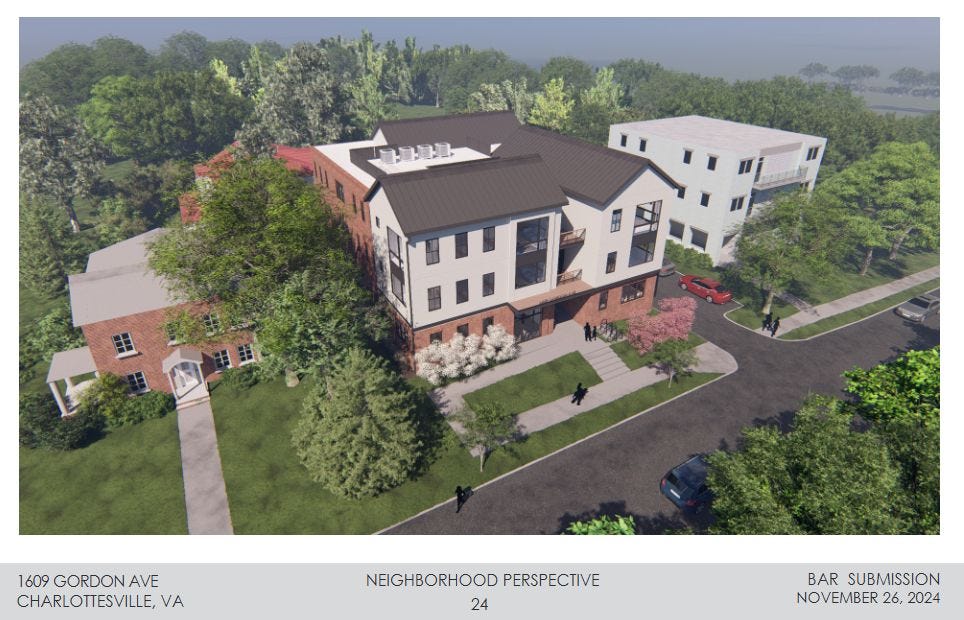
In total there are four pre-application conferences for Certificates of Appropriateness. The first two are for alterations for single family homes with one at 606 Lyons Court and the other at 745 Park Street.
The third is for 1000 Wertland Street which is one of three sites where the University of Virginia and the UVA Foundation are donating land for affordable housing projects. A group called Preservation for Affordable Housing is taking the lead on this one which the BAR last saw in May as I wrote at the time.
The Development Code allows up to 11 stories at this location if all of the affordability bonuses are met but the design from Grimm + Parker Architects anticipates only six levels. For future reference, this presentation offers a primer on what the city’s affordability levels are.
“At the Base Level, 10 percent of dwellings in residential projects require rents be affordable to tenants earning 60 percent of [Area Median Income] for 99 years (or fee-in-lieu),” reads one of the slides in the presentation. “At the Bonus Level, 10 percent dwellings in residential projects require rents be affordable to tenants earning 50 percent of AMI for 99 years or (fee-in-lieu).”
This proposal anticipates 180 rental units with all of them affordable. There would be a parking garage below the building with 83 spaces and 16,000 square feet of retail.
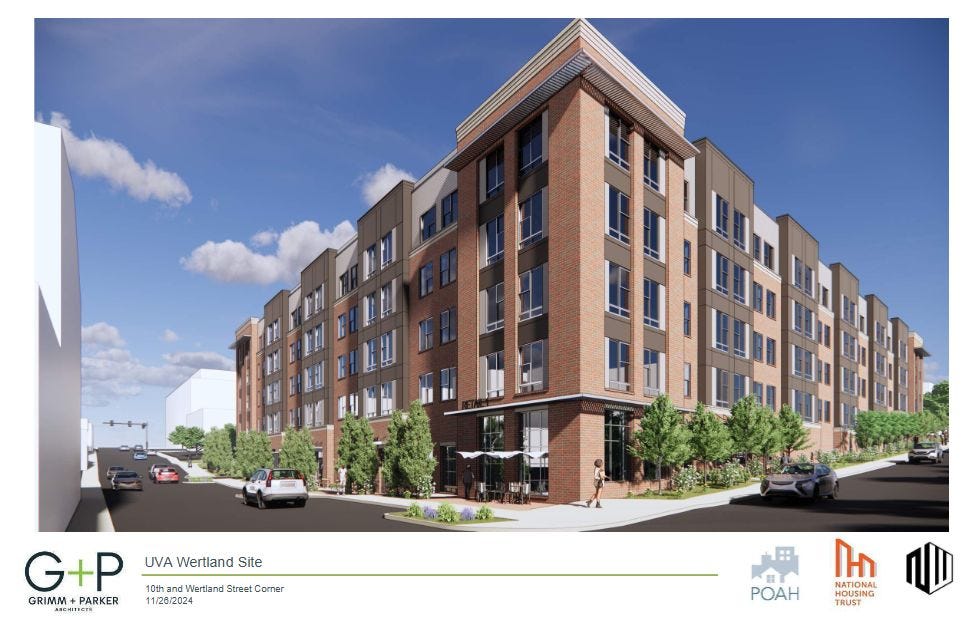
The final item on the agenda is a resumption of the pre-application for 200 West Main Street. Heirloom Development went before the BAR in November as I reported for C-Ville Weekly and hope to produce a longer version by Tuesday’s discussion.
“The applicant has requested an opportunity to share during the meeting “an expanded shadow study [as requested by the BAR on November 19] so we can continue that conversation about the effects [the] height and stepbacks have on shading and views,” reads the staff report. “[And] present that in conjunction with the information [related to the Wolf-Josey Mall Tree Study] and tie it together. [The applicant is] seeking feedback on the proposed stepbacks in the presentation and advice on what BAR may want to see next.
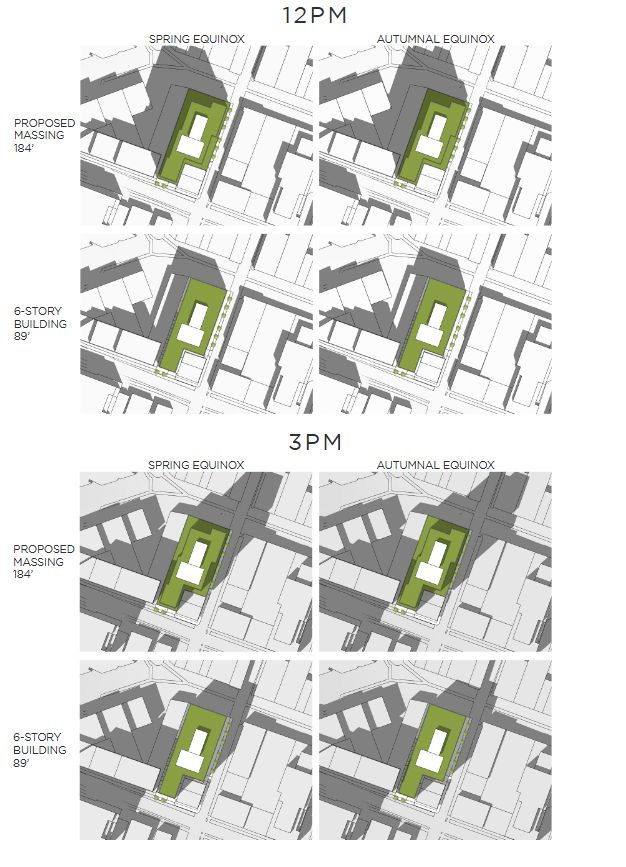
In another meeting:
- The Parks and Recreation Department will present the “Key Technical Findings, Preliminary Recommendations and Draft Framework plans for the Parks & Recreation Master Plan.” See Monday’s City Council listing for more information. This will take place at 6 p.m. the Carver Recreation Center at 233 4th Street NW. (more info)
Wednesday, December 18, 2024
Fluvanna Supervisors holding budget work session, public hearings on zoning changes
The final meeting of the Fluvanna County Board of Supervisors is a full one. The five members begin at 5 p.m. with a work session on the FY26 budget followed by the regular meeting at 6 p.m. The work session is in the Morris Room of the County Administration Building and the regular session will be held in the Circuit Courtroom in the Fluvanna Courts Building. (meeting packet)
The work session will feature presentation from five entities that receive funding from Fluvanna County for their FY26 requests. These are the Legal Aid Justice Center ($7,500), the Thomas Jefferson Planning District Commission ($43,705), the Monticello Area Community Action Agency ($70,000), the Central Virginia Partnership for Economic Development ($17,492), and Piedmont Virginia Community College ($7,570)
There are five presentations.
- Representatives from Robinson, Farmer, Cox Associates will present the Annual Comprehensive Financial Report for FY24. (learn more)
- There will be a semi-annual report on the Children’s Services Act. (learn more)
- There will be a presentation on the EMS Cost Recovery Program. (learn more)
- There will be a discussion of the regulation of signs. (learn more)
- There will be an update on code enforcement. (learn more)
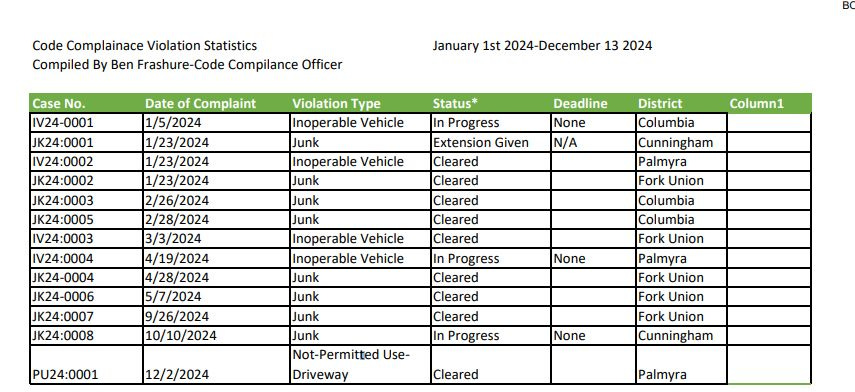
There are three action matters.
- There is a request to carry over $61,124.24 in funds from FY24 to FY25 related to the Blue Ridge Health District. (learn more)
- There will be recommendations on who to appoint to the Board of Zoning Appeals. (learn more)
- There will be a request to change the location of a $70,000 project at Pleasant Grove Park anticipated in the FY24 budget. The idea had been to create a back state area but now the funding will be used for a stage cover. (learn more)
Then there are two public hearings, both of which are amendments to the county’s zoning ordinance.
- The first would be to add crematoriums and pet crematoriums to the definition of “funeral home” as well as a change in the definition of “commercial kennel” to add animal training. (learn more)
- The second would clarify the requirements of the phrase “shielded and screened from view.” (learn more)
In other meetings:
- The Charlottesville Housing Advisory Committee will meet at noon in CitySpace though there is no agenda at publication time. (calendar #1) (calendar #2)
- The Charlottesville Albemarle Metropolitan Planning Organization meets virtually at 4 p.m. The agenda is not posted on the website at publication time and I do have it in my inbox but I’ll have a preview in an edition of the newsletter later this week. (MPO website)
- The Albemarle Conservation Easement Authority will meet virtually at 4:45 p.m. (meeting info)
- The Nelson County Board of Supervisors and the Nelson County Planning Commission will have a joint meeting at 5 p.m. I will have more of a preview later this week. (meeting info)
- The Greene County Planning Commission will meet at 6 p.m. for work sessions on agritourism and the creation of a technology / flex research and development district. I’ll have more of a preview in a newsletter later this week given the length of this installment. (agenda packet)
Thursday, December 19, 2024
Both of Charlottesville’s elected bodies to meet to discuss FY26 budget
The Charlottesville School Board will meet with the Charlottesville City Council for a joint budget work session. This will be held at the Walker Upper Elementary School Cafeteria beginning at 5 p.m. (meeting info)
There are no details in the City Council packet or the School Board agenda. The details might be interesting to review in advance. I went digging to see if I could find anything in the December 5 School Board meeting but all I could come up with was this six-page presentation.
In other meetings:
- The Charlottesville Human Rights Commission will meet for the final time in 2024 with a work session that is already anticipated to be carried over to January 2, 2025. (agenda)
Will there be an installment next week? This depends on if there are meetings and so far there’s at least one scheduled. Whatever will I do without this Sunday routine? Take a look back, of course!
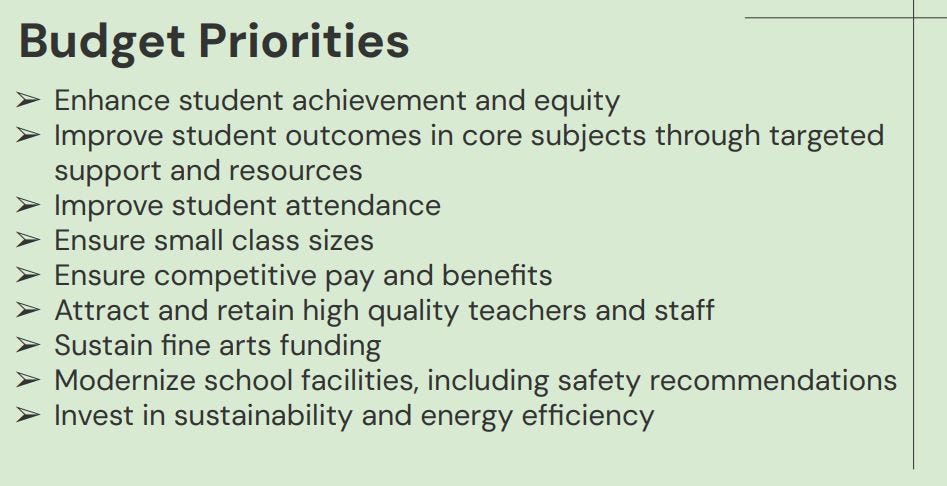
This post was contributed by Sean Tubbs. Sean is a journalist working to build a new information and news outlet centered around Charlottesville and Virginia. In 2020, he launched a daily newscast and newsletter and also created a semi-regular podcast on the pandemic.
Support for Sean’s “Week Ahead” update comes from The Piedmont Environmental Council.
